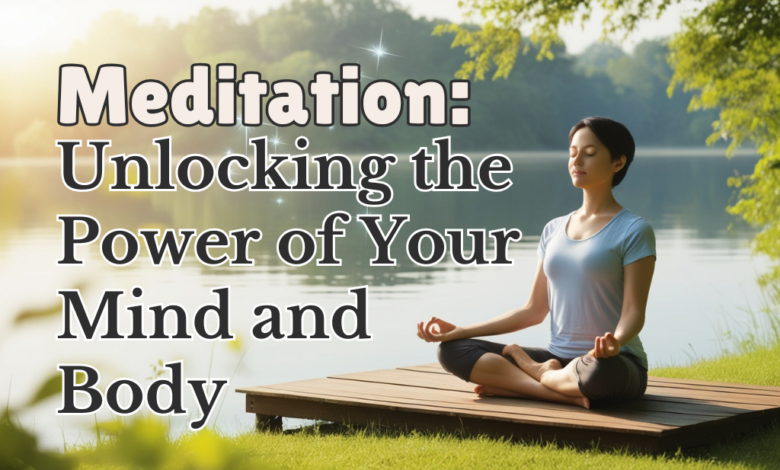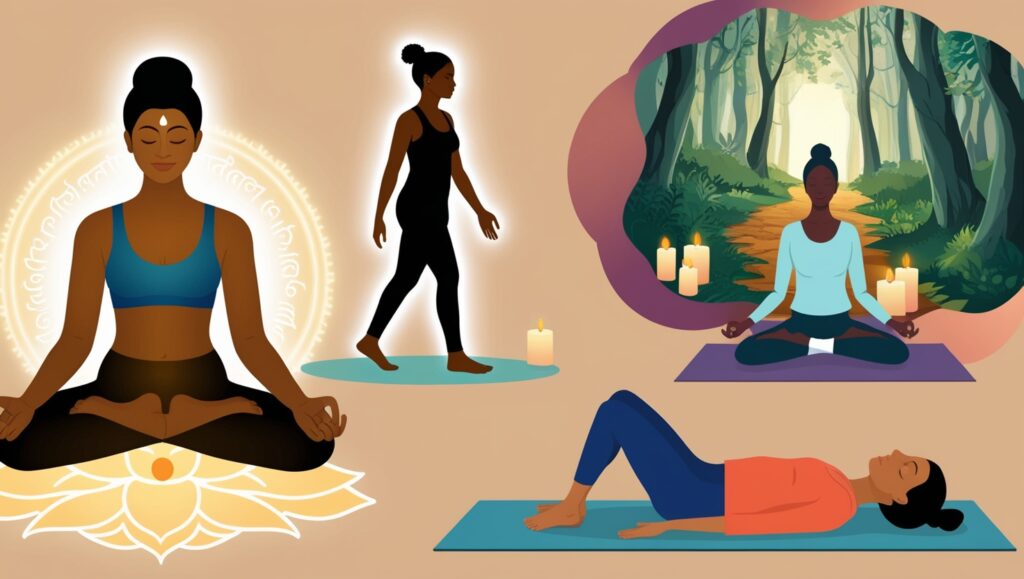Meditation: Unlocking the Power of Your Mind and Body

Meditation has been practiced for thousands of years, yet its relevance and benefits are more evident today than ever before. This simple yet profound practice can transform your mental health, boost your well-being, and help you find peace in a chaotic world. Whether you’re new to meditation or curious to learn more, this guide will provide you with everything you need to get started.
What is Meditation?

Meditation is a practice that helps you focus or clear your mind using various techniques. It involves intentional concentration on your breath, body sensations, a specific thought, or even a mantra.
People use meditation for different purposes, including relaxation, stress reduction, improving focus, and even breaking bad habits like smoking. Modern science has revealed how meditation changes the brain, enhancing mental health and overall well-being.
While the act of meditating may appear simple—like sitting quietly or repeating a phrase—what happens in your brain is remarkable. Advanced tools like EEG and fMRI scans show that meditation can improve brain function and emotional regulation.
Is Meditation Religious?

Meditation has roots in ancient philosophies and religions, but you don’t have to be religious to meditate. It’s a versatile practice suitable for anyone, regardless of beliefs.
Here are some examples of meditation practices, both religious and non-religious:
- Buddhist Meditation: Practices like Zen or Tibetan meditation are rooted in Buddhism and focus on mindfulness and inner peace.
- Christian Meditation: Reflective prayer or contemplation is often seen as a form of meditation in Christianity.
- Guided Meditation: Non-religious and often used in therapy or self-help settings, guided meditation involves listening to a teacher or audio guide.
- Yoga: A physical and mental practice combining movement and mindfulness, originating in India.
- Mindfulness Meditation: Staying present in the moment without judgment, often used for stress relief.
How Do You Meditate?

There’s no one-size-fits-all approach to meditation, which makes it accessible to everyone. Here are some common methods:
- Body-Centered Meditation: Focus on the sensations in your body, like your breathing or heartbeat.
- Mantra Meditation: Repeat a word, sound, or phrase to help focus your mind.
- Movement Meditation: Engage in activities like walking or yoga while staying mindful of your movements.
- Mindfulness Meditation: Pay attention to the present moment without getting lost in thoughts about the past or future.
- Visual Meditation: Focus on a physical object or imagine a calming scene in your mind.
Try experimenting with different methods to find one that resonates with you.
What Are the Benefits of Meditation?

Meditation offers a wide range of benefits for your mind and body:
- Reduces Stress and Anxiety: Meditation calms the mind, helping you cope with stress and overwhelming emotions.
- Improves Focus and Memory: It enhances your ability to concentrate and retain information.
- Boosts Emotional Health: Meditation fosters positive emotions and improves your ability to handle negative feelings like anger or sadness.
- Supports Physical Health: Mental well-being directly impacts your body, improving sleep, lowering blood pressure, and boosting heart health.
Scientific studies show that regular meditation changes the brain’s structure, making areas associated with emotional regulation and memory stronger.
How to Start Meditating Daily

Getting started with meditation is simple. Follow these steps to build your practice:
- Choose a Type of Meditation: Research different techniques and pick one that suits your needs.
- Set Aside Time: Whether it’s 5 minutes or 30 minutes, make meditation part of your daily routine.
- Create a Comfortable Space: Find a quiet and calming spot where you can sit or lie down.
- Be Patient: Meditation is a skill that takes time. Don’t get discouraged if your mind wanders—just gently bring your focus back.
- Seek Guidance: Use apps, online videos, or attend local classes to help you refine your technique.
Why Does Meditation Work?

The science behind meditation is fascinating. When you meditate, neurons in your brain form stronger connections, particularly in areas related to focus, emotions, and sensory processing.
Regular meditation:
- Strengthens the brain areas responsible for managing stress and emotions.
- Reduces age-related decline in brain function.
- Improves your ability to process negative emotions like fear or sadness.
Final Thoughts
Meditation is an ancient practice with modern benefits. Whether you’re looking to reduce stress, improve your focus, or simply find a sense of calm, meditation is a tool that can enhance your life. Start small, stay consistent, and explore the different types of meditation until you find one that feels right for you.
Take a deep breath, clear your mind, and begin your journey to a healthier, happier you today!



